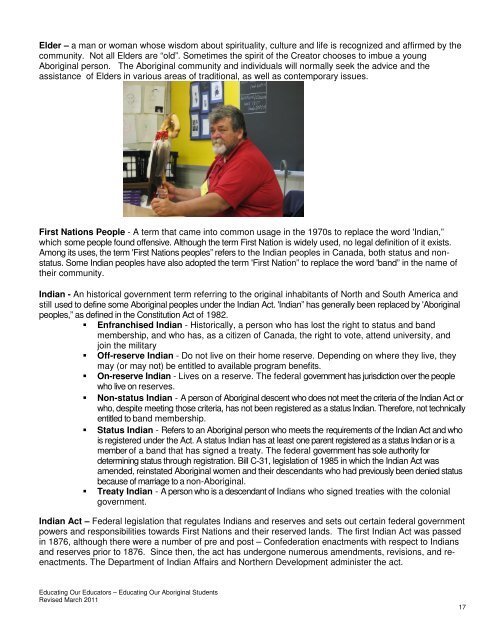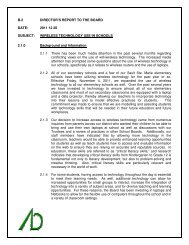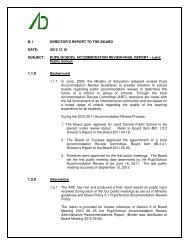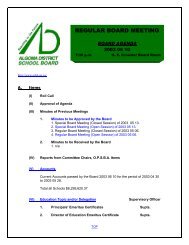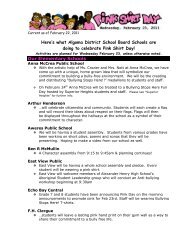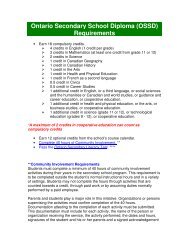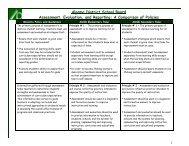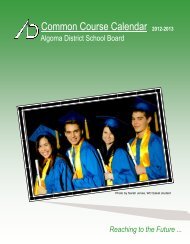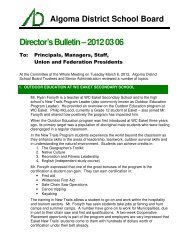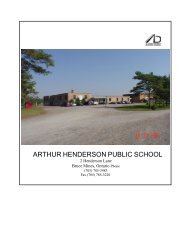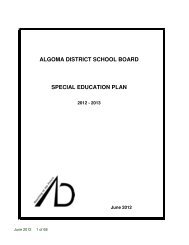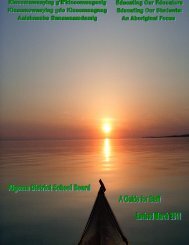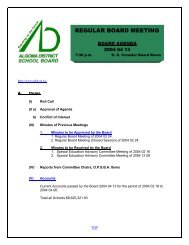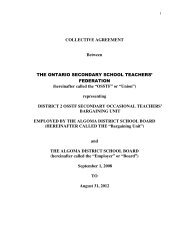Educating Our Educators Guide for Staff - Algoma District School ...
Educating Our Educators Guide for Staff - Algoma District School ...
Educating Our Educators Guide for Staff - Algoma District School ...
- No tags were found...
You also want an ePaper? Increase the reach of your titles
YUMPU automatically turns print PDFs into web optimized ePapers that Google loves.
Elder – a man or woman whose wisdom about spirituality, culture and life is recognized and affirmed by thecommunity. Not all Elders are “old”. Sometimes the spirit of the Creator chooses to imbue a youngAboriginal person. The Aboriginal community and individuals will normally seek the advice and theassistance of Elders in various areas of traditional, as well as contemporary issues.First Nations People - A term that came into common usage in the 1970s to replace the word 'Indian,”which some people found offensive. Although the term First Nation is widely used, no legal definition of it exists.Among its uses, the term 'First Nations peoples” refers to the Indian peoples in Canada, both status and nonstatus.Some Indian peoples have also adopted the term 'First Nation” to replace the word 'band” in the name oftheir community.Indian - An historical government term referring to the original inhabitants of North and South America andstill used to define some Aboriginal peoples under the Indian Act. 'Indian” has generally been replaced by 'Aboriginalpeoples,” as defined in the Constitution Act of 1982. Enfranchised Indian - Historically, a person who has lost the right to status and bandmembership, and who has, as a citizen of Canada, the right to vote, attend university, andjoin the military Off-reserve Indian - Do not live on their home reserve. Depending on where they live, theymay (or may not) be entitled to available program benefits. On-reserve Indian - Lives on a reserve. The federal government has jurisdiction over the peoplewho live on reserves. Non-status Indian - A person of Aboriginal descent who does not meet the criteria of the Indian Act orwho, despite meeting those criteria, has not been registered as a status Indian. There<strong>for</strong>e, not technicallyentitled to band membership. Status Indian - Refers to an Aboriginal person who meets the requirements of the Indian Act and whois registered under the Act. A status Indian has at least one parent registered as a status Indian or is amember of a band that has signed a treaty. The federal government has sole authority <strong>for</strong>determining status through registration. Bill C-31, legislation of 1985 in which the Indian Act wasamended, reinstated Aboriginal women and their descendants who had previously been denied statusbecause of marriage to a non-Aboriginal. Treaty Indian - A person who is a descendant of Indians who signed treaties with the colonialgovernment.Indian Act – Federal legislation that regulates Indians and reserves and sets out certain federal governmentpowers and responsibilities towards First Nations and their reserved lands. The first Indian Act was passedin 1876, although there were a number of pre and post – Confederation enactments with respect to Indiansand reserves prior to 1876. Since then, the act has undergone numerous amendments, revisions, and reenactments.The Department of Indian Affairs and Northern Development administer the act.<strong>Educating</strong> <strong>Our</strong> <strong>Educators</strong> – <strong>Educating</strong> <strong>Our</strong> Aboriginal StudentsRevised March 201117


